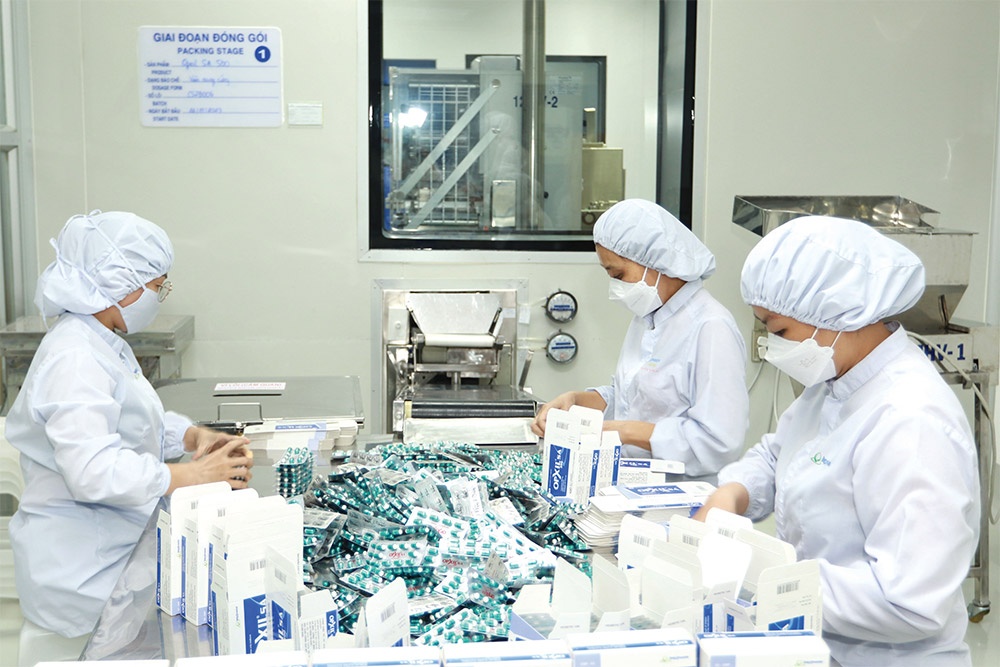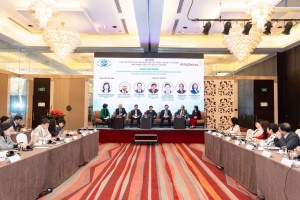Multinationals keen on drug changes
At the Whitebook launch held by the European Chamber of Commerce in Vietnam (EuroCham) in Hanoi on April 11, Le Viet Dung, deputy director of the Drug Administration of Vietnam under the Ministry of Health (MoH) said that the ministry was working on revision of rules on drug import and registration, as well as simplifying administrative procedures to improve the business climate.
“In the draft decree, we remove the requirement asking pharmaceuticals importers to update information related to the efficacy and safety of drugs on labels and instructions for use of imported drugs in circulation in Vietnam,” he said.
At present, drug importers failing to meet requirements are stopped from submitting applications for import licences for drugs and pharma ingredients for 1-2 years.
 |
| Drug import and registration rules are being refined, photo Le Toan |
According to the European Standards Medicines Sector Committee (ESMSC), updating information on labels and instructions for use is the responsibility of the drug registration facility. Importers are not owners of the circulation registration certificate, so they cannot do the update. Moreover, the Law on Pharmacy also does not stipulate the responsibility of importers in updating information on labels and instructions for use.
Gregoris Charitonos, chairman of ESMSC, said, “Vietnam stands at a pivotal moment in the growth of its pharmaceutical industry. With the right policies and decisive actions, we have the opportunity to become a hub for pharmaceutical innovation, engage high-quality European investments, and strengthen the domestic manufacturing capabilities.”
Dung also noted that the MoH has removed the inspection requirement for new technology drugs. As a result, manufacturing facilities that either have drugs and pharmaceutical ingredients registered for circulation in Vietnam, or have been assessed and certified as meeting good manufacturing practices (GMP) by a stringent regulatory authority or a drug administration agency recognised by the MoH – based on World Health Organization classification – will now be exempt from inspection. Previously, these facilities were still subject to such checks.
In addition, the MoH has amended regulations concerning GMP certificates and manufacturing licences. If a competent foreign regulatory agency does not issue a GMP certificate, manufacturing licence, or inspection report as required by the MoH, registration units and drug or pharmaceutical ingredient manufacturers may instead submit other legal documents issued by recognised authorities to demonstrate compliance with GMP.
“The replacement will remove difficulties for businesses in cases foreign management agencies do not issue GMP or production licences (like the US) so that they can be implemented as soon as the decree is issued without having to wait for guidance circulars from the MoH,” said the ministry representative
Drug registration and import have been among the issues of special concern for years among multinational corporations, although they have been adjusted many times. ESMSC now presents the voice of many multinationals, including Abbott Laboratories, GSK, Adamed Pharma, Sandoz Vietnam, DKSH Vietnam, and Viatris Vietnam.
2024 marked a pivotal milestone for Vietnam’s pharmaceutical industry with the introduction of key legislative amendments, including the laws on pharmacy, health insurance, and bidding. These reforms address existing regulatory barriers, improving both patient access and market entry, while laying the groundwork for future implementation. However, much remains to be done to ensure regulations are consistent and in line with international best practices, reflect post-pandemic societal changes, and encourage international integration.
A representative of EuroCham’s Pharma Group Sector Committee said, “For foreign-invested and local pharmaceutical companies alike, a business environment that guarantees a clear-cut, actionable administrative and regulatory framework is a pre-requisite to maintain and enhance investment and expand their operations in Vietnam sustainably and healthily.”
“2025 is the year of bringing these progresses into force while addressing obstacles that remain, to improve patient access to innovative medicines and vaccines, as well as elevating Vietnam’s position as a priority market in attracting investment,” he added.
With the new changes, multinationals expect better conditions to make their next steps in Vietnam. The improvement is also part of Vietnam’s effort to become one of the top three investment destinations in ASEAN within three years.
At present, regarding availability for the new drugs, Vietnam has 9 per cent of new medicines, compared to 27 per cent in Singapore.
As a volume share of the pharmaceutical product segments, Vietnam has one of the lowest percentages of originators across Asian markets, at less than 4 per cent. In contrast, over-the-counter products account for about 70 per cent of the market, while branded and unbranded generics account for the remaining 26 per cent. Comparing this to ASEAN partners like Thailand (with originators at 8 per cent) and Singapore (14 per cent), Vietnam has a low level of access to innovative medicines.
 | Promoting pharma technology transfer with more policy support Experts have urged Vietnam to issue more support policies to facilitate technology transfer in pharmaceuticals and vaccine manufacturing, enabling it to achieve the ambitious goal of becoming a regional hub for the latest medication. |
 | Health Ministry, Sanofi strengthen cooperation in pharmaceutical industry development Sanofi-Aventis Vietnam Co., Ltd. is seeking to strengthen cooperation with the Ministry of Health (MoH) to increase access to new medicines for Vietnamese people and develop the pharmaceutical industry. |
What the stars mean:
★ Poor ★ ★ Promising ★★★ Good ★★★★ Very good ★★★★★ Exceptional
Related Contents
Latest News
More News
- Masan Consumer names new deputy CEO to drive foods and beverages growth (February 23, 2026 | 20:52)
- Myriad risks ahead, but ones Vietnam can confront (February 20, 2026 | 15:02)
- Vietnam making the leap into AI and semiconductors (February 20, 2026 | 09:37)
- Funding must be activated for semiconductor success (February 20, 2026 | 09:20)
- Resilience as new benchmark for smarter infrastructure (February 19, 2026 | 20:35)
- A golden time to shine within ASEAN (February 19, 2026 | 20:22)
- Vietnam’s pivotal year for advancing sustainability (February 19, 2026 | 08:44)
- Strengthening the core role of industry and trade (February 19, 2026 | 08:35)
- Future orientations for healthcare improvements (February 19, 2026 | 08:29)
- Infrastructure orientations suitable for a new chapter (February 19, 2026 | 08:15)

 Tag:
Tag:



















 Mobile Version
Mobile Version